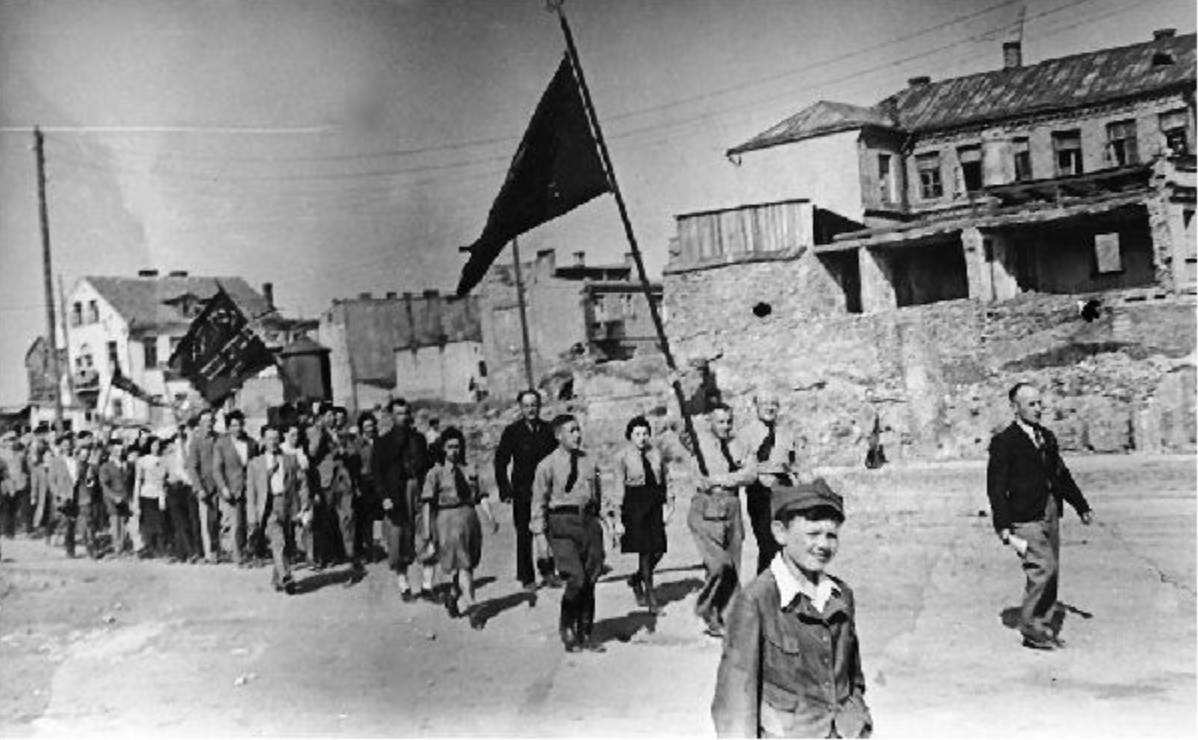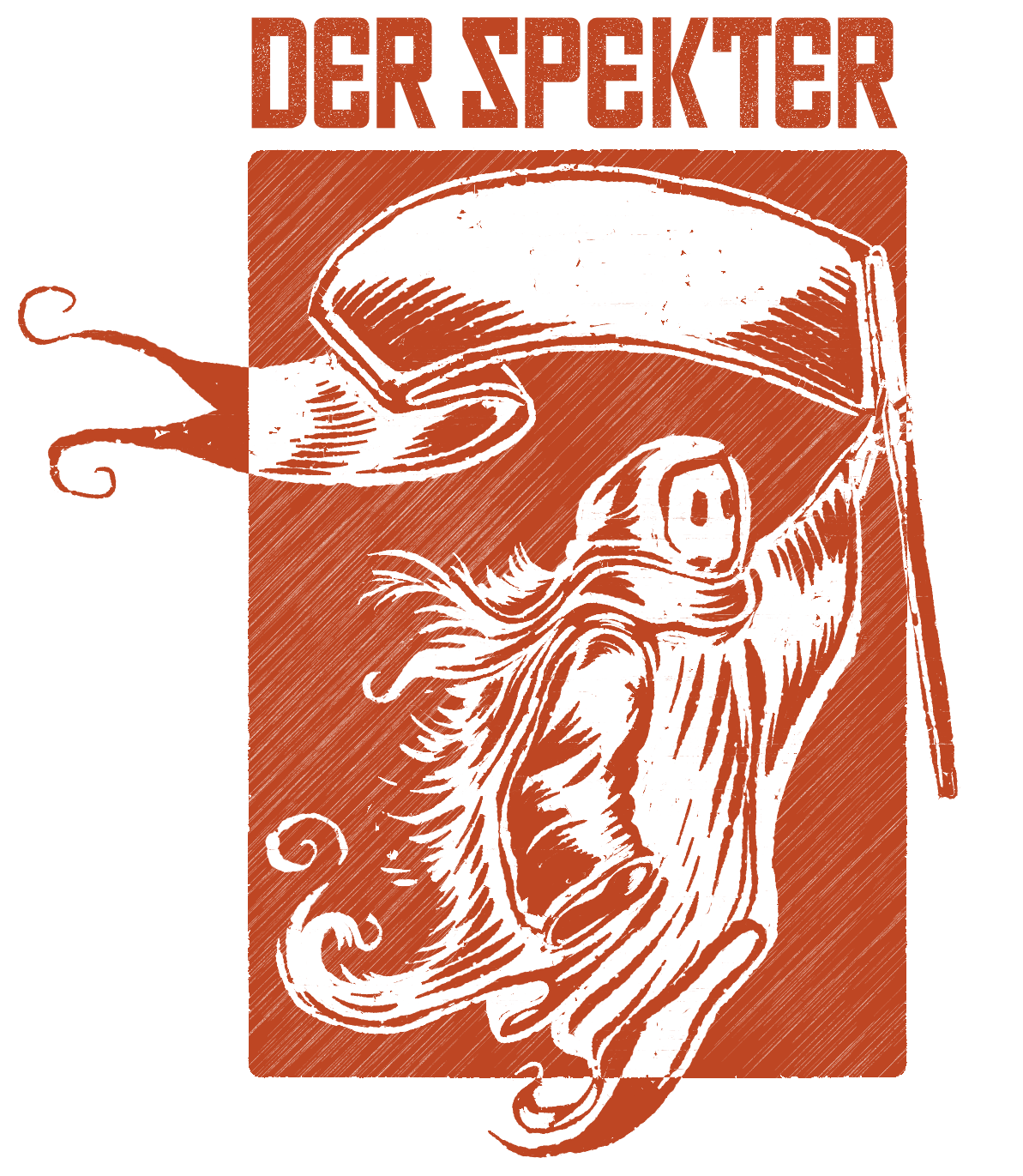Our Unfinished Struggle for Justice on May Day
The Palestinian call for general strike on May Day and Nakba Day and how the Bund celebrated May Day in decades past

May Day—Yontif fun Arbet, the Worker’s Holiday in Yiddish—has been a central date in the Bund’s calendar and a focal point for Bundist organizing, propaganda, and mobilization since before the Bund’s founding. Julius Martov’s May Day speech in 1895 is recognized as a pivotal moment in the Bund’s formation, when the Jewish workers’ movement began the shift to mass public agitation in the pursuit of revolutionary action. May Day is once again upon us, and the Melbourne Bund continues to celebrate the holiday, though it is a far different organization today than in years past.
This May Day 2024, many of our khaveyrim find themselves struggling alongside thousands of other protesters on college campuses across the world for Palestinian freedom and liberation, only to be met with arrest, abuse, suspension, or expulsion. Among the more than 1,600 arrested so far are many workers—professors, graduate students, or student workers putting their bodies and jobs on the line in the name of Palestine. And for more than half a year, many across our world have lost their jobs for daring to raise their voice against genocide. Proof that all of our struggles are deeply intertwined.
Free story for any reporter (don't reach out to me, reach out to folks in @SW_Columbia): Grad students are currently locked out of university medical care. Our health insurance requires us to see a University primary care provider to obtain referrals
— jon ben-menachem (@jbenmenachem) April 30, 2024
So it’s no surprise that a growing number of labor unions are expressing statements condemning Israel’s brutal attacks on innocents in Gaza. As Nathali Hrizi, Vice President of Substitutes for United Educators of San Francisco (UESF) told the People’s Dispatch in March, the labor movement in the United States plays a particularly crucial role in demanding an end to the U.S.-backed Israeli genocide of Palestinians and taking further actions to bring it to an end.
Back in April, the Palestinian General Federation of Trade Unions in Gaza called on workers around the world to stage a general strike on May Day as well as Nakba Day, May 15. “Palestinian workers have always been the backbone of the Palestinian struggle for freedom and justice. Israel's deliberate targeting of trade union facilities, including the Palestinian General Federation of Trade Unions headquarters in Gaza, along with all our offices, constitutes a flagrant assault on the very livelihoods of Palestinian workers,” the union writes.
It called on fellow workers around the world to take action by:
- Refusing to handle goods going to or coming from Israel
- Organizing a work stoppage or slowdown
- Holding educational meetings with your trade union branch to discuss the Palestinian struggle
- Distributing educational pamphlets or flyers in your workplace to provide resources for action
- Circulating a workplace petition calling for specific actions or policy changes, such as divestment from funds or companies complicit in the occupation or boycott measures against complicit companies
In moments like these, we are reminded of the importance of solidarity among the workers of the world. They prove the necessity of a vibrant resurgence of Bundism and the Labor movement, wherever we are. As we witness its vibrant revival, we take a look back at the conversation around May Day in Bundist publications of the past.
May Day was first proclaimed in 1889 at the Second International in Paris. As Daniel Mahla details, Bundist labor leaders in interwar Poland were involved in the earliest May Day celebrations and organized annual demonstrations and political actions. These actions were festive, but the goals were quite serious, Mahla writes: “to bring public life to a halt and to impose a proletarian yontef throughout the country.”
The Bund’s 1908 May Day communique, “May Day in Russia,” exemplifies the struggles facing Jewish workers in the aftermath of the 1905 Russian Revolution. Hopeful with its cry of “long live our bright ideal, Socialism; our method, the struggle; the only bearer of the standard, the proletariat!” In the midst of “a time full of doubt and misgiving” and “dull despair,” the Bund calls on workers to continue their war against capital “with the joy of the victory of to-morrow.”
May Day statements in the New York-based Jewish Labor Bund Bulletin newsletters from 1948 through 1951 grapple with the conditions of traumatized, victimized, and displaced Jews after World War II, the nascent Israeli state, and Bundists’ long-running disagreement with Stalinist totalitarianism.
The 1948 statement is direct and forthright in its denunciation of the nationalist violence in Palestine and calls for a socialist alliance to address common needs in the region. It further highlights the plight of Jewish war refugees and calls on the world’s nations to “open their doors to them.”
By 1949, the Bulletin refocused its attention on the Bund’s long-standing conflict with Soviet authoritarianism and offered a hopeful — if naive in hindsight — embrace of the trajectory of FDR’s New Deal order and British Socialism.
The decline of the Bund led to slowing publication of the Bulletin, with no statements issued in 1950 and a consolidated March-May issue in 1951 that sought to “re-establish the old continental Bundist tradition” and reclaim May Day as a “Socialist Jubilee.” The Bund was forthright that the way “to deliver the Jewish people—a nation of the world—and to free it of suffering and of the dangers to which it is exposed, is not by building a state of our own, not by subscribing to the ideals of Zionism, but by waging the fight, together with all libertarian forces of the world, for the world's transformation along the principles of liberty, justice, and socialism” and to not “let Communists or others who disgrace Socialism monopolize this festive day.” Decidedly anti-Soviet/Communist and anti-Zionist, the Bund calls on Jewish workers to “intensify the struggle for the socialist reconstruction of our country and of the world.”
![1905 May Day leaflet A scan of an aged brown Yiddish leaflet of the Bund party (the General Union of Jewish Workers in Lithuania, Poland, and Russia) about the May Day celebration “The First of May.” Printed in Yiddish by the Bund typography. In the leaflet the Central Committee of the Bund celebrates the May Day of some year after 1905 (dated by the leaflet’s reference to “bloody terror,” i.e. the government’s suppression of the 1905 Russian revolution), emphasizing that it’s celebrated by every worker in the entire world. The leaflet concludes with the traditional socialist May Day slogans:“Long live the revolution!Down with the autocracy [i.e., the Russian tsarism]!Struggle for the national cultural autonomy!Long live the immediate national legal equality!Struggle for the Constituent Assembly elected on the basis of the universal, equal, direct elections by secret ballot!Long live the 8-hours work day!Down with militarism! Long live folk-militia!Long live socialism!Long live the international proletariat!Long live the First of May!”In the 1900s, the Bund was a part (the Jewish faction) of the Russian Social-Democratic Workers’ Party (RSDRP, after its Russian acronym). Hence, the letterhead of the leaflet includes both the Bund and the RSDRP.](https://www.derspekter.org/content/images/2024/05/XLGCjianzlwBI6aRtshfDzvZ3jcuEhafEw1Xr0gOtmD8hSyRLvoAOX5DDaG3s7Ggjn1DaQdLGUJ5Y2HBfWbSFHj__gcLw4ietpx1uK4XGhUFCc8HRYUUTlDW8j-aD4SGTsmcRAztZMqai6wrKuyxM0U-2.png)
In his essay in the American Jewish World Service, Stuart Schear remembers his Bundist grandmother, her May Day enthusiasm in the midst of the 1905 Russian Revolution and in subsequent celebrations in New York, and the parallels of her Bundism with the contemporary struggles of other sub-national groups trying to maintain their culture and autonomy while under pressure from ethnonationalist forces.
Schear realized the Kachin women of Burma—cast out of society yet practicing their culture's mother tongue in defiance of the state—were not dissimilar to the Bundists of his grandmother’s generation. The working women of the world “fight for a world that affirms difference and diversity while guaranteeing full human rights for all,” he writes.
We close this essay with a selection Schear says his grandmother sang to him in 1975, “Arbeter Froyen,” a plea for solidarity among working women of the world:
Working women, suffering women … Why do you stand on the sidelines?
Why don’t you help us build a temple of freedom and human happiness ….
More than once, brave women have made tyrants … tremble.





